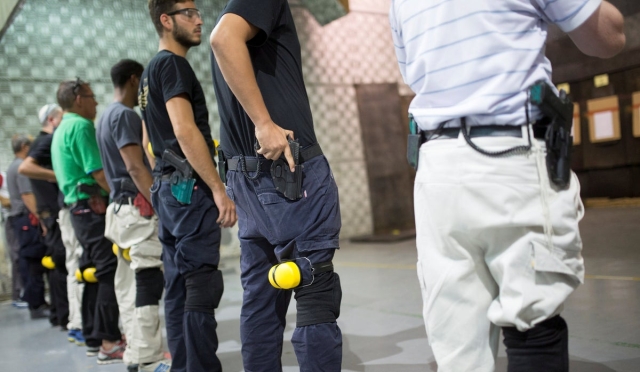Amidst an alarming increase in terror acts by Palestinian militants, Minister of National Security Itamar Ben Gvir plans to make it significantly easier to obtain a civilian license to carry concealed handguns.
After a series of steps he took to significantly shorten the queues for the interview phase for gun licenses, Minister Ben-Gvir agreed with the director general of the office, Advocate Shlomo Ben Eliyahu, on a number of additional steps to speed up the process. His last change resulted in approximately 12,000 applicants receiving an interview in just a month and a half, unheard of in a highly bureaucratic system like Israel's where the process for obtaining a permit for a personal-use weapon is arduous as well as meticulous.
Ben Gvir Eliminates Personal Interviews of Many Candidates for Gun Licenses - @JewishPress - https://t.co/pP3pH9zbfH
— JewishPress.com (@JewishPress) May 1, 2023
According to the new changes, additional groups will be exempted from a physical interview at the firearms bureaus, and the right to obtain a weapon will be issued only after approval by the Israel Police and the Ministry of Health. Those who will receive the exemption are Israel Defense Forces combat veterans who are less than five years from the date of discharge, as well as those who are on active reserves, police officers, and firefighters. Soldiers who were not 'gun-rated' during their service will still need to go through the former channels.
Minister Ben Gvir, said: "We see again and again that in many terrorist attacks, there is a great significance to the carrying of personal weapons that are around and we will do everything we can to loosen the traffic jam and allow everyone who passes the tests to receive a permit for a weapon." In the Office of the Minister of National Security, It is noted that work is currently being done in order to facilitate the gun exams necessary for obtaining a civilian weapons license, and after the completion of that work, the new examinations will be submitted for approval by the National Security Committee of the Knesset chaired by MK Zvika Vogel.
In a country like Israel where to get a legal gun license requires lots of paperwork and regulations...but oddly there is a mass of gun violence and illegal weapons. They could be traced and the people that use them given tough sentences...but that won't ever happen.
— Seth Frantzman (@sfrantzman) April 15, 2023
In Israel, gun applicants must take a shooting course at a licensed range, as well as a test to demonstrate proficiency in handling the weapon. Most license owners are limited to one weapon, and even ammunition is regulated with the maximum amount of shells allowed at any given moment restricted to 50. Once a license has been approved, the holder must still train with the weapon in order to maintain the license. The above laws are not up for discussion at this time, and it is not expected that these laws will change.
Hadas Danieli Yelin, CEO of the Women's Lobby, said in response to these measures that "We strongly oppose Minister Ben Gvir’s new plan. For thousands of women and children, the ease of granting weapons licenses and flooding the country with weapons is a real danger and further undermines the sense of personal security. In the years 2019-2021, 9 women were murdered in Israel by men who had a gun license. The presence of firearms in the home causes women who are in a violent relationship to live in a constant sense of danger and makes it difficult to get out of the cycle of violence. Just before making life-threatening statements, you should remember that granting the concessions to possess weapons threatens thousands of women and children who live under violence in their homes."
Ben Gvir easing gun license bureaucracy, aiming to arm civilians to fight crime. All legible Israeli citizens should be armed to defend themselves against terror including women
— Linga (@Linga95107081) April 30, 2023
Despite the Women’s Lobby’s concerns, in the last year, it is evident that weapons in the hands of civilians are a significant tool in preventing terrorist acts. An example of this was given on Monday last week, during a car-ramming attack in Jerusalem, where an armed citizen shot at the terrorist and prevented him from continuing his terrorist campaign and harming innocent civilians.
Despite the hyperbole from those against weapons, obtaining a weapon in Israel is very difficult. While there might be images of people looking like civilians walking the streets with automatic rifles strapped around their shoulders, it is because the army requires that soldiers never lose sight of their weapons, even when off duty. The penalty for a combat soldier who leaves a weapon behind unattended while on break is severe. There are options for soldiers to leave their weapons on base, however, that proves difficult for some soldiers who are stationed in one part of the country but whose base is in another.


